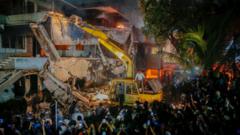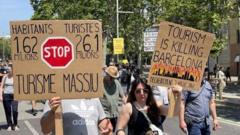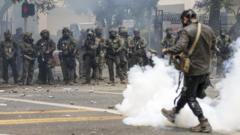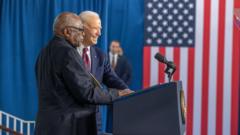Following the exile of Sheikh Hasina, tensions escalate amid demands for justice and accountability in Bangladesh.
Protests Erupt in Bangladesh as Former PM's Family Home is Set Ablaze

Protests Erupt in Bangladesh as Former PM's Family Home is Set Ablaze
Protesters ignite unrest over Sheikh Hasina's return, targeting family properties in violent backlash.
Protests in Bangladesh have spiraled into violence as demonstrators vandalized and set ablaze the family home of former Prime Minister Sheikh Hasina, along with properties belonging to other members of her political party. The eruption of unrest was ignited by Hasina's planned address to the nation via social media from India, where she has sought refuge since being ousted by student-led protests last year.
Sheikh Hasina, who led Bangladesh for two decades, has been accused of autocratic rule characterized by severe oppression of dissent. In a striking display of anger, an excavator demolished the house of Hasina’s late father, Sheikh Mujibur Rahman, who is revered as the founding president of Bangladesh. The building, formerly a museum, has been repurposed for various functions but was targeted by protesters seeking to express their discontent.
Hasina’s father is often celebrated as a national hero; however, the fallout from his daughter's controversial regime has marred his legacy in the eyes of many. Addressing the devastation through a Facebook livestream, Hasina expressed her condemnation of the arson, stating, "They can demolish a building, but they can't erase history."
Once seen as a pro-democracy beacon, Hasina's reputation has been severely tainted due to allegations of electoral fraud, political repression, and charges of corruption during her time in power. With arrest warrants issued against her in connection to last year’s protests—where hundreds lost their lives—her escape to India did little to lessen public outrage against her and the Awami League party.
On the same night of the arson, protesters also vandalized residences and businesses belonging to senior Awami League officials, fueled by social media narratives calling for the removal of "symbols of fascism." Reports indicate that approximately 700 demonstrators confronted the targeted properties, prompting a significant police presence.
Amid the turmoil, a caretaker government led by Nobel laureate Muhammad Yunus has been established to govern the country, although it struggles to manage the unrest that has continued to grow. As protests persist, thousands are participating in demonstrations demanding accountability for Hasina's conduct, particularly in relation to her heavy-handed approach toward student protests.
The Yunus administration is also grappling with a potential economic crisis, with Yunus accusing Hasina of inflating Bangladesh's economic successes and misappropriating considerable sums during her tenure. He has pledged to initiate elections by late 2025 or early 2026 as the political landscape remains uncertain in the aftermath of Hasina's regime.
Sheikh Hasina, who led Bangladesh for two decades, has been accused of autocratic rule characterized by severe oppression of dissent. In a striking display of anger, an excavator demolished the house of Hasina’s late father, Sheikh Mujibur Rahman, who is revered as the founding president of Bangladesh. The building, formerly a museum, has been repurposed for various functions but was targeted by protesters seeking to express their discontent.
Hasina’s father is often celebrated as a national hero; however, the fallout from his daughter's controversial regime has marred his legacy in the eyes of many. Addressing the devastation through a Facebook livestream, Hasina expressed her condemnation of the arson, stating, "They can demolish a building, but they can't erase history."
Once seen as a pro-democracy beacon, Hasina's reputation has been severely tainted due to allegations of electoral fraud, political repression, and charges of corruption during her time in power. With arrest warrants issued against her in connection to last year’s protests—where hundreds lost their lives—her escape to India did little to lessen public outrage against her and the Awami League party.
On the same night of the arson, protesters also vandalized residences and businesses belonging to senior Awami League officials, fueled by social media narratives calling for the removal of "symbols of fascism." Reports indicate that approximately 700 demonstrators confronted the targeted properties, prompting a significant police presence.
Amid the turmoil, a caretaker government led by Nobel laureate Muhammad Yunus has been established to govern the country, although it struggles to manage the unrest that has continued to grow. As protests persist, thousands are participating in demonstrations demanding accountability for Hasina's conduct, particularly in relation to her heavy-handed approach toward student protests.
The Yunus administration is also grappling with a potential economic crisis, with Yunus accusing Hasina of inflating Bangladesh's economic successes and misappropriating considerable sums during her tenure. He has pledged to initiate elections by late 2025 or early 2026 as the political landscape remains uncertain in the aftermath of Hasina's regime.






















